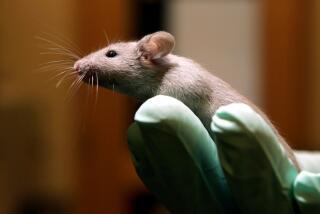Embryonic stem cells created using unfertilized eggs
- Share via
Scientists say they’ve created embryonic stem cells by stimulating unfertilized eggs, a significant step toward producing transplant tissue that’s genetically matched to women.
The advance suggests that someday, a woman who wants a transplant to treat a condition such as diabetes or a spinal cord injury could provide eggs to a lab, which in turn could create tissue that her body wouldn’t reject.
Embryonic stem cells can develop into virtually any tissue of the body, and scientists hope to harness them for producing specialized tissues to treat a range of illnesses. But such research has faced political roadblocks because harvesting the stem cells destroys embryos.
The new research tries another tack: stimulating an unfertilized egg to begin embryonic development. Scientists don’t believe this development can continue long enough to produce a baby, but they think it can produce stem cells that are genetically matched to the egg donor. Such an approach could not provide matched cells for men.
The work, published online by the journal Cloning and Stem Cells, is reported by scientists from Lifeline Cell Technology of Walkersville, Md., and from Moscow. The researchers report producing six lines of embryonic stem cells, one of which had chromosomal abnormalities. They obtained their eggs from five women who were having in vitro fertilization and who agreed to donate some.
“It’s a new type of embryonic stem cell line from a different kind of embryo,” said George Daley, a scientist at the Harvard Stem Cell Institute. “We just don’t know whether these cells will be as good as embryonic stem cells from naturally fertilized embryos.”
Ronald M. Green, a Dartmouth College ethicist, said he believed the egg-stimulation process would prove an ethically acceptable way to create stem cells.
“People will see that these are activated eggs.... They do not of themselves ever develop into a human being,” he said. “This is not anything biologically or morally like a human embryo, and it’s a very good way of trying to provide human embryonic stem cells that does not involve the destruction of an embryo.”
But Father Tad Pacholczyk of the National Catholic Bioethics Center in Philadelphia disagreed.
“My view is that if these grow as organized embryos for the first few days and then arrest, they may just be very short-lived human beings,” he said. “One is very possibly dealing with a defective human being. And at a minimum, the benefit of the doubt should be given here, and these embryos should not be created for the purposes of destroying them.”






